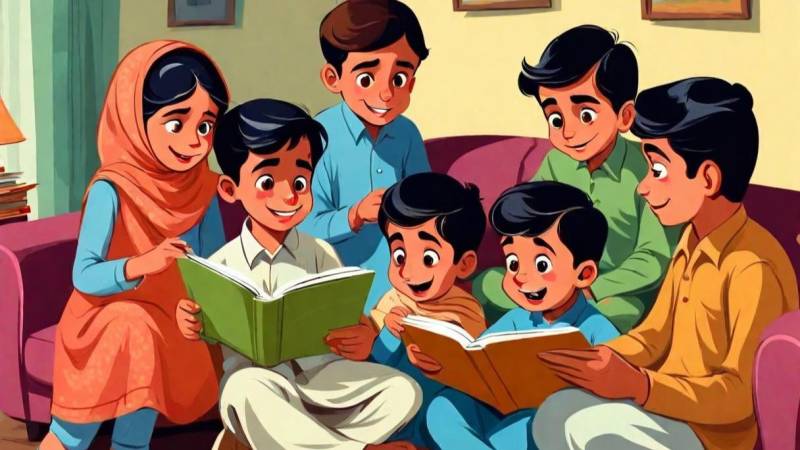
I was in the sixth grade when my uncle gifted me "The Adventures of Tom Sawyer". The book was my birthday present, and I did not know what to do with it. It gathered dust in the cupboard until one cold winter night when I took it up and started reading.
This was my first book, and I found the character of Tom Sawyer so intriguing that I finished it in one week. Tom is a ten-year-old boy growing up along the Mississippi River in the 1840s. He is adventurous, resourceful, and nonconformist, defying Aunt Polly (his guardian), hating school, and having a crush on Becky Thatcher (his classmate and the new girl in town). It was like reading about my own life in a novel.
I am now an English instructor and have always observed children and adolescents around me. Sadly, these days, many young people do not read at all, and those who do pick lighter stuff like the Harry Potter series. While the popularity of the series is an established fact, young readers do not derive the same joy from it as they do from classic and contemporary literature. These books can also serve as the last nail in the coffin of reading: I am not surprised to find that most children who read Harry Potter do not explore other genres.
Conversations with parents and teachers show that they want young people to read books and savour the emotional and intellectual depth of characters, as literature has proven to be an antidote to prejudice, xenophobia, and cultural narcissism. We all know that books impart emotional intelligence, critical thinking, and writing skills. There is a consensus among psychologists that childhood reading is consequential in cognitive and language development, vocabulary and comprehension, attention span and creativity, and stress resilience.
Bertrand Russell, in his seminal work "On Education", stresses the importance of reading in fostering independent thought and character, gaining access to a wide range of ideas, and instilling a lifelong love for learning. Virginia Woolf believed that reading from a young age can shape one's perception of the world and foster independent opinions.
Despite the benefits of books, smartphones and the daily grind of school take up most of young people's time, leaving little motivation and energy for thoughtful reading.
Reading has been declining all over the world as children and adults spend their free time glued to screens and doom-scrolling
The good news is we can get young people to read without any hassle.
For children aged six through ten, parents should read aloud to them before bed and choose books (discussed below) that are captivating and adventurous. Correct pronunciation and intonation should be implemented, and the meanings of a few difficult words should be explained. It is not necessary to explain every word as this breaks the flow of the story and makes it tedious for the child. When exposed to extensive listening and reading, kids cultivate the inference technique and understand the meaning as well as the context of words without consulting a dictionary. Looking up every word kills the joy of reading for adults as well.
For adolescents, guardians should employ positive reinforcement to develop reading habits. Educators and parents should celebrate children's reading achievements and encourage them to read more. A friend of mine incentivised his fifteen-year-old daughter by promising her a gift if she read and discussed five novels with him. This method not only made her a voracious reader, but also deepened their relationship.
Guardians should create a reading niche in their homes stocked with different genres of books. They should serve as role models for children by reading themselves and reading together. Young people and their parents should talk about books and frequently visit libraries. For tech-savvy kids, e-books and reading apps should be provided to pique their curiosity.
In the educational institutions, reading assignments should be given frequently and libraries should be inhabited. Schools and colleges should hold literature festivals, as well as poetry and reading sessions.
When selecting books for young people, classics like "Alice's Adventures in Wonderland", "The Adventures of Tom Sawyer", "The Adventures of Huckleberry Finn", "The Adventures of Pinocchio", "The Arabian Nights (editions for children)", "Robinson Crusoe", "Twenty Thousand Leagues Under the Sea", and "A Christmas Carol" are all excellent reads.
Reading has been declining all over the world as children and adults spend their free time glued to screens and doom-scrolling. In Pakistan, kids find little incentive to read when they see elders and older siblings enchanted by smartphones.
Parents and educators should take up the gauntlet and encourage children to read through bedtime stories and positive reinforcement. The choice of books should be age-appropriate and serious. Critical thinking and political consciousness of the next generation depend on reading. Literature can be a bridge between different ethnicities, religions, sects, and races, helping to combat intolerance and extremism in the country.
Looking back at fifteen years ago, today I realise that I would not have not developed a reading habit had I not read that gift book. Nor would I have been a broad-minded human being open to new ideas and perspectives. Literature has transformed me into a grateful person who cherishes wisdom and nature more than consumerism and ambition. Books can have the same impact on those who embrace reading.

